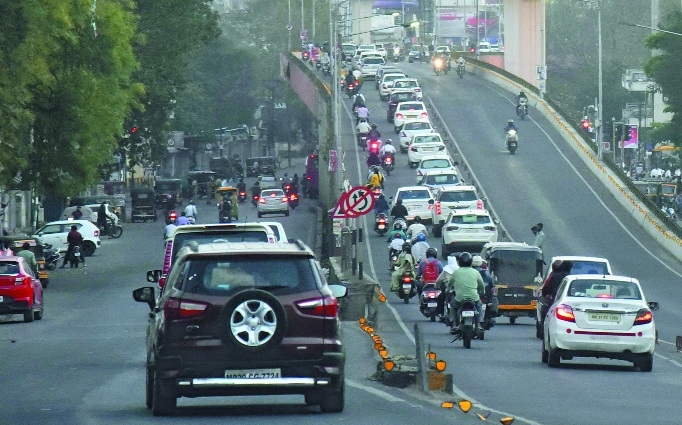City performing poorly in NCAP to improve air quality
| Date :20-Jul-2021 |

Rising number of vehicles adding to the air pollution of city.
By Kaushik Bhattacharya :
Centre tells to reduce air pollution level by 15% to get the next installment
Despite allocation of funds for 6,000 e-buses by MOEF&CC to different cities across the country, only 600 buses have been procured
THE revised action plan prepared by Nagpur Municipal Corporation (NMC) and Maharashtra Pollution Control Board (MPCB) to control air pollution in city is going to be a lengthy exercise as no concrete step has been taken so far by the civic body to match its own deadline of November 2021. Recently, National Green Tribunal (NGT) had directed all States and Union Territories (UT) to prepare action plans under the National Clean Air Programme (NCAP) to bring air quality standard within the prescribed limits. Following the same, NMC, with the help of MPCB, prepared an action plan for the city. The plan emphasises on many factors -- ban on use of age-old vehicles; more use of public transport; curb fuel adulteration; better parking facility; widening of roads; identification of traffic congestion hotspots and much more.
As per the civic body, all the working areas mentioned in the action plan will have to be completed before November 2021. However, it seems that all claims made by NMC for improvement of city’s air quality is just a cosmetic exercise and the improvement process will cross further the time limit. “The pandemic and the lockdown have reduced the pace of work that we initiated last year to improve the air quality of the city,” said Shweta Banerji, Superintending Engineer, Public Health and Environmental Engineering Department, NMC, told ‘The Hitavada’. “Vehicular emission is the biggest factor for air pollution in the city and we had contacted Regional Transport Office (RTO) to restrict age-old vehicles in the city but we have not received any response from their side so far,” said Banerji.
NMC had plans to urge Maha Metro to provide its parking lots and also included RTO for improvement of parking system in the city. This initiative is also not yet implemented by the civic body. “We have received Rs 10 crore but no instructions received so far regarding its utilisation from the Chief Accounts and Finance Officer (CAFO) Office,” said Banerji. According to Maharashtra Pollution Control Board (MPCB), second installment under NCAP will be received on the basis of work done by the civic body. The MPCB said, the Urban Local Body (ULB) must have to reduce the air pollution level by 15% to get the next installment. As per studies, existing old and under-maintained vehicles are responsible for 10-15 per cent of total air pollution in city. According to the action plan, BS-IV technology reduces the emission rate by over 20 per cent as compared to the previous BS-III technology. In the era of BS-VI, when Central Government is implementing latest technology in all vehicles, the revised action plan is talking about the outdated BS-IV technology.
“The action plan is more focused on BS IV and explains the reduced emission norms of BS IV as compared to BS III. In the month of March, Ministry of Environment, Forest and Climate Change (MOEF&CC) signed a Memorandum of Understanding (MoU) with representatives of State Pollution Control Boards, Urban Local Bodies and Institutes of Repute for 132 identified cities for implementation of city specific action plans under NCAP. Prakash Jawdekar, the then Environment Minister also urged States to quickly procure e-buses for public transport purpose sanctioned under the FAME Scheme. Regretting that despite allocation of funds for 6,000 e-buses to different cities across the country only 600 buses have been procured and are operational. Jawdekar during the event also said if any city fails to utilise funds sanctioned for procurement of e-buses allocation will go to other cities.